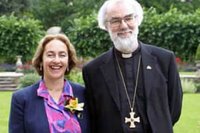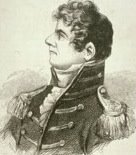Declare San Joaquin Vacant
In a stark and deliberate shirking of his responsibilities to the Episcopal Church and to his own episcopacy, which must now be regarded as a failure in need of immediate repair, the current bishop of San Joaquin has replied to the November 20 letter of ++Bishop Katharine with language richly attesting to his abandonment of our Church.
The particulars of his letter need not be referenced in detail because at this date the Network's blusterous and stiff-necked statements have become well-worn caricature. What is somewhat new in this instance is that the elderly Schofield seems to have so gleefully accepted the role of public test case (or crazy uncle) for the Network.
His letter is mostly strident language, threats to not prevent the "intervention" by primates interested in snapping up Episcopal parishes and monies, and the sad self-fueling anger and isolation that has characterized too many Network clergy and bishops since the coalescence of the group in 2004.
The letter, composed on Episcopal Church letterhead, is a mishmash of threats, lack of good will, and an unswerving refusal to build up or in any way recognize the Episcopal Church, its people, and work. In any person, the freedoms to assume such positions are guaranteed. In a bishop of the church, they are not tantamount to, but in fact are, an abandonment of the Church he has sworn more than once, to protect and build up.
The final withering of Schofield's authority and legitimacy may arrive by this weekend's upcoming diocesan Convention, which he has urged repeatedly and publicly to disown its own Church. ++Katharine has reminded him in her letter that urging such, invites inhibition and a new bishop of San Joaquin.
And yet, the destabilization and division of the Church, are the very activities that Schofield's new letter again so eagerly anticipates and promotes.
If every Network bishop were graded independently of the other there no doubt might be some variation along the bell curve in the areas of Christian charity, humility, honesty, unity, and Episcopal polity.
But not so in the case of John Schofield. He has richly earned an "F" in polity, humility, honesty and in basic episcopacy. He may be forgiven these shortcomings, but the Church must not continue to countenance them in a Bishop of San Joaquin.
To maintain the integrity of the Episcopal Church, to protect the spiritual well being of its people and institutions, and to hold to account a rogue episcopacy, he should be presented at the first opportunity.







